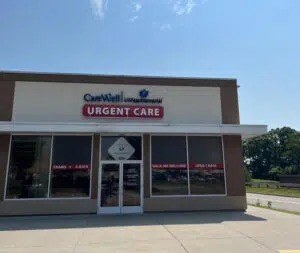Understanding Fevers: When to Get Help
Fevers can be a sign that your body is fighting an illness or infection. While they’re common, knowing when to seek urgent care for fevers can help you feel more confident about next steps. Recognizing fever symptoms—like chills, sweating, body aches, and fatigue—can guide you in deciding if home care is enough or if a visit to a provider is best.
If you or a loved one are feeling under the weather, our experienced team at CareWell Urgent Care is here to help you navigate what to do if you have a fever. Whether it's a mild temperature elevation or a more concerning spike, understanding the steps to manage your illness and how to reduce fever can make all the difference in your healing.
In some cases, a mild fever can be managed at home. In others, such as with prolonged or severe symptoms, medical attention is important to rule out more serious issues. Learn more about diagnostic options through our urgent care testing services. For parents, understanding these signs is especially helpful when caring for kids, as you’ll read in our guidance below and in our child illness resources.
How to Care for a Fever at Home
When you have a fever, it's essential to know what to do to manage it effectively.
Here are some steps to consider for effective fever treatment:
- Check and Monitor Your Temperature
Begin by measuring your body temperature with a thermometer. A normal body temperature typically ranges between 97°F (36.1°C) and 99°F (37.2°C). A fever is generally defined as a temperature above 100.4°F (38°C). - Stay Hydrated
Dehydration can make a fever worse. Drink fluids, such as water, herbal teas, and clear broths, to stay hydrated. - Get Plenty of Rest
Give your body the rest it needs to fight the underlying infection or condition. - Over-the-Counter Fever Reducers
Over-the-counter fever reducers like acetaminophen (Tylenol) or ibuprofen (Advil) can help lower your fever and alleviate discomfort. Follow the recommended dosages and consult a healthcare professional if you have concerns. - Apply Cool Compresses
A cool, damp washcloth applied to your forehead and body can relieve fever-related discomfort. Avoid using ice or very cold water, as extreme temperature changes can be harmful to your health.
If you suspect your fever is due to a contagious illness, like the flu or COVID-19, it's crucial to isolate yourself to prevent spreading the infection to others.
If your fever is persistent, extremely high, or accompanied by severe symptoms like difficulty breathing, chest pain, confusion, or persistent vomiting, seek immediate medical attention. For emergencies, dial 9-1-1.
When Kids and Adults Should Visit Urgent Care
Knowing when to go to urgent care for a fever varies by age. While adults often seek medical attention for high fevers or ones that last several days, infants and young children might require urgent care for lower-grade fevers due to their vulnerability to serious infections.
Infants
Babies under 3 months with any fever should receive emergency care right away.
Toddlers
A toddler fever of 102°F (38.9°C) or higher may require a visit for child fever urgent care, especially if symptoms last more than 2 to 3 days or if the fever is accompanied by irritability, discomfort, vomiting, or other concerning symptoms.
Children
Older children should be seen if a fever is above 102°F or lasts more than two days. If your child shows signs of vomiting or other concerning symptoms alongside the fever, it's essential to visit urgent care promptly.
Adults
Fever in adults that exceeds 103°F or persists for several days warrants an urgent care visit. Seeking medical attention is crucial if it is accompanied by symptoms such as headache, abdominal pain, vomiting, or other concerning symptoms.
Our centers are equipped for all ages, with on-site services like EKG testing and treatment for minor injuries when needed.
ER vs. Urgent Care: Where to Go for a Fever
Deciding whether to go to the emergency room (ER) or urgent care for a fever can be confusing. However, by understanding the differences between ER vs. urgent care now, it can save time and get you the right care faster when sickness strikes.
Here's a breakdown to help you determine the best course of action:
Go to Urgent Care if:
- Your fever is at or above 102°F but you are stable
- You have additional mild to moderate symptoms such as sore throat, neck stiffness, or sinus pain
- You need evaluation for possible infection without life-threatening signs
Go to the ER if:
- Fever in an infant under 3 months
- Very high fever with confusion, seizures, breathing problems, or severe pain
- Fever in someone with a compromised immune system
If you're unsure whether to see a healthcare provider for a fever or other symptoms, it's always best to consult a healthcare professional. Urgent care can be a good option for evaluating and treating fevers, especially if you have additional symptoms or concerns. Our team can guide you to the right level of care.
Get Fast Fever Relief at CareWell
At CareWell, we provide walk-in urgent care seven days a week for patients of all ages. From mild fever to more complex cases, we deliver quick, thorough evaluations so you can start feeling better sooner. Our team can help you decide if urgent care is the right fit or if emergency care is needed for your situation.
With locations across Massachusetts and Rhode Island, you can find a center near you and get back to feeling your best—without long waits or unnecessary ER visits.












